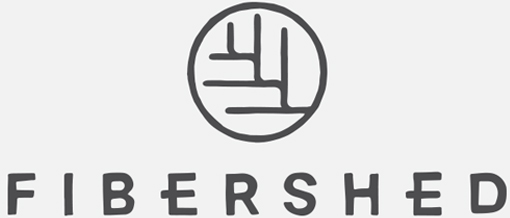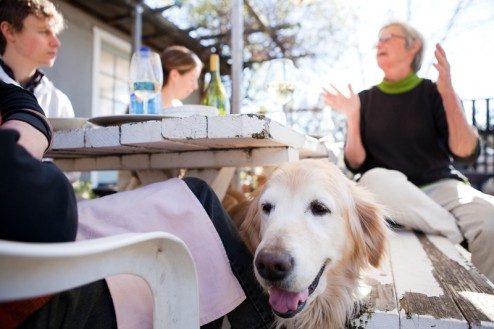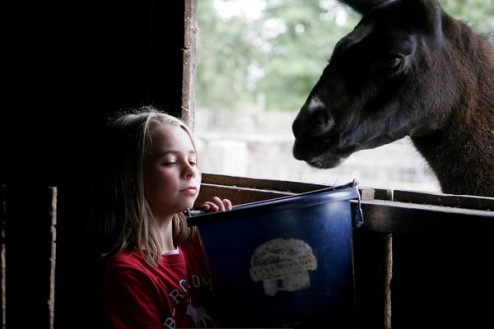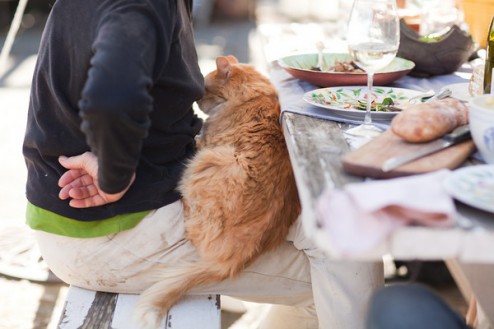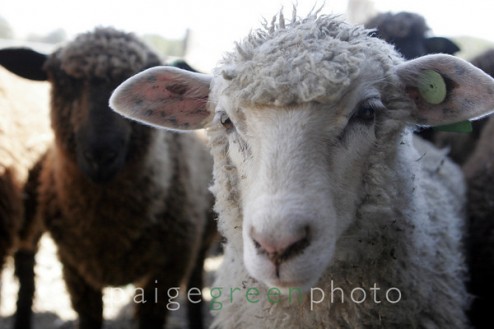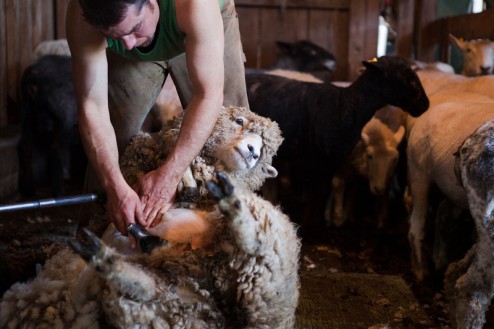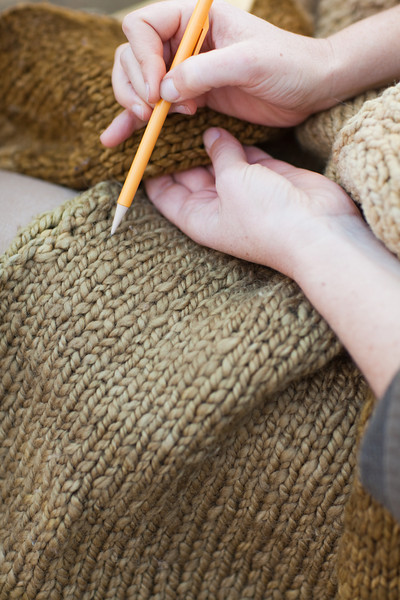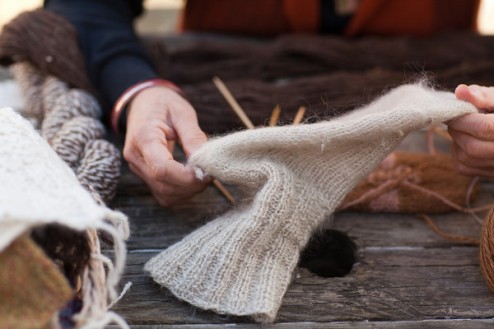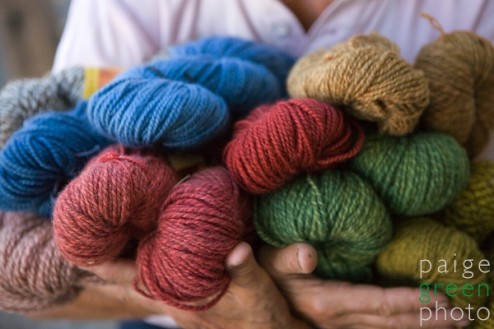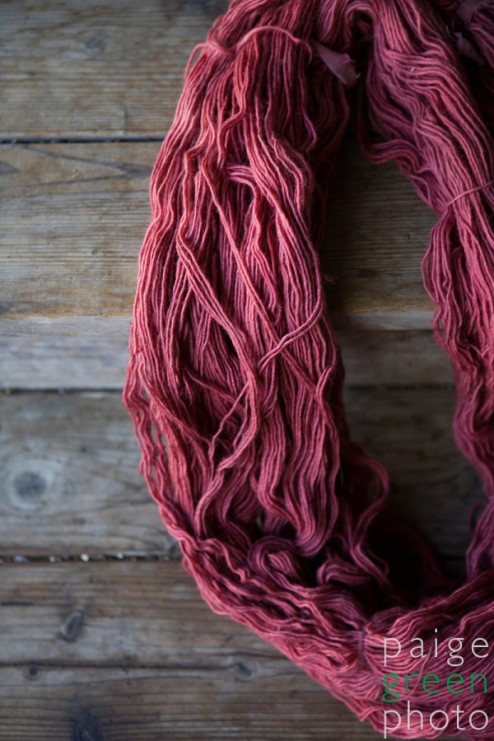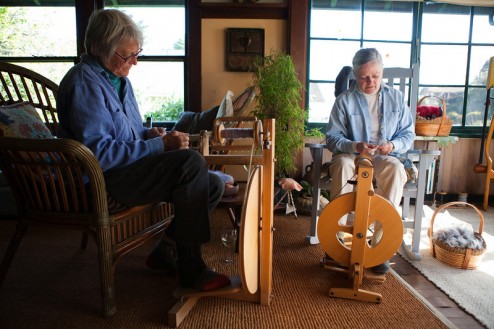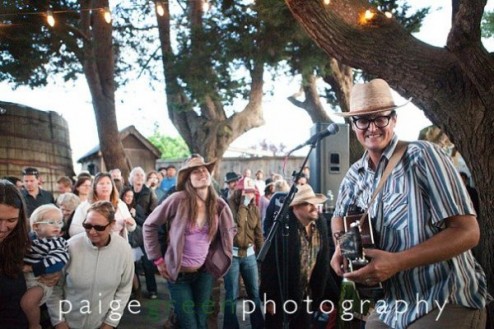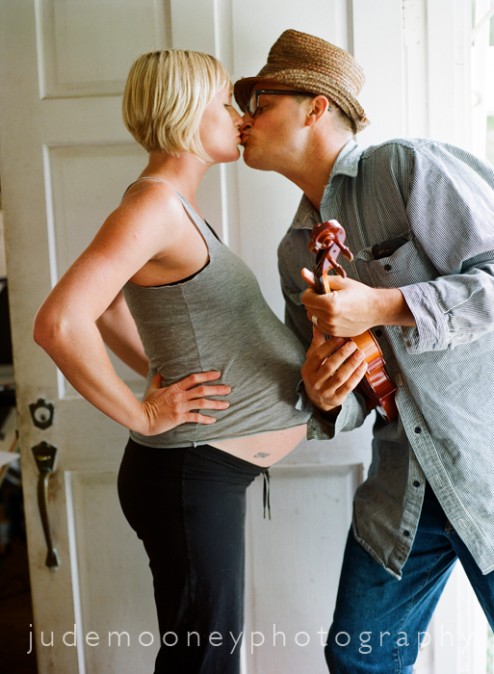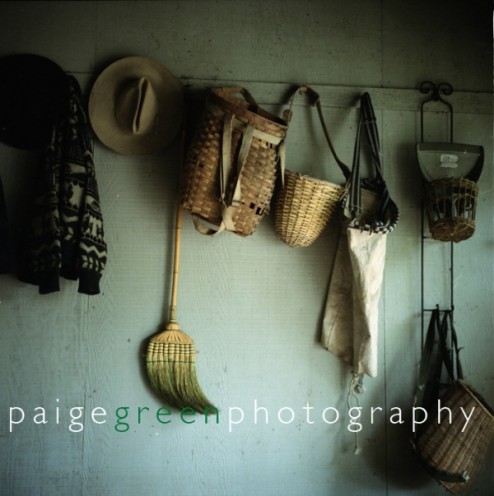Windrush Farm in Chileno Valley, California stands as one of our communities most endearing fiber and farming hubs. Founded in 1995 by Mimi Luebbermann, the farm grew from an intention of living simply, farming fiber, and functioning as a quiet space for Luebbermann’s longstanding writing career. The farm has since become a destination for Bay Area spinning and knitting groups, seasonal craft fairs, and during the summer the place is transformed by Luebbermann and her son Arann Harris, into the “best home-grown, grass-fed, tree-climbing, organically-run, farm camp around“… for a host of children from the surrounding area. Luebbermann’s community calendar of events and private writing time, have woven together amongst a bustling schedule of impromptu visitors, and hungry animals.
Luebberman’s exposure and love of agriculture developed in her very earliest years, during her families operation of an east coast farm. This formative period growing up in an agricultural setting inspired Luebbermann’s love for animals, provided an exposure to fiber, and immersed her in the rhythms of farm life. Her adult writing career carries the threads of these early impressions; with book titles such as, “The Heirloom Tomato Cookbook,” and “My Garden, A Five Year Journal.”
With twenty two book titles, and a majority of them based in the art of raising food and gardening, Luebbermann’s writing reflects her connection to natural processes and cycles. The rearing of sheep, and the cycles of wool are another example of the regenerative processes that inspire her. “I spent a year in Australia, and dreamed of becoming a chef for the sheep shearing crews, getting up at 6am, cooking breakfast for the camp, and then moving on to the next station.” Now on Luebbermann’s own Windrush farm she cares for a bustling flock of 22 Shetland, 22 corriedale crosses, and 10 llamas and alpacas. She rents a neighboring retirement pasture for 25 sheep that have been taken out of the breeding program. “These older girls have a wonderful life with lots of pasture and no breeding stress,” said Luebbermann.
This care for her animals is one of many ways in which the fiber arts community is endeared to Luebbermann’s wool and incredible yarn. In line with her commitment of care– Luebbermann invites Johnny Sanchez to her farm annually for the great shearing process. “He is so skilled and careful with the sheep. I like to have him shear early in the year, there are less flies bothering the sheep once they have their coats removed,” she said. Sanchez grew up on a sheep farm just northwest of Windrush, and over the years has become well known in the community for his precise and careful work. This year’s shearing will take place on Sunday, February 26th, everyone is welcome to come and observe the process.
Luebbermann’s flocks produce some of the region’s loveliest mid-range wools, fibers that are ideal for performance and outerwear, socks, and clothing that needs a heartier raw material to sustain its function over the longterm. “The most well known wool varieties, like merino, are loved for certain properties– however, wool is like ice-cream, there are many flavors to choose from.” Bringing an awareness of wool breeds and the first and best use of their fiber is one of Luebbermann’s most critical educational points. “If you want to make garments that last, start by choosing a wool that is best suited for the job.” In line with this sentiment, the Fibershed wardrobe experimented and compared varieties of wool within one sweater. Handspun corriedale cross roving was made into a chunky artisanal yarn, and knitted alongside a similar gauge handspun merino yarn. Merino ranges from 18-24 microns and corriedale ranges from 25-31 microns, (according to a chart provided by the Wild Fibres publication).
The results after a year’s wear and tear show that the corriedale cross to have pilled less, and remained smoother and even cleaner in response to the external elements. This casual form of research did prove to us that the mid-range wools were and are a very good choice for outerwear garments.
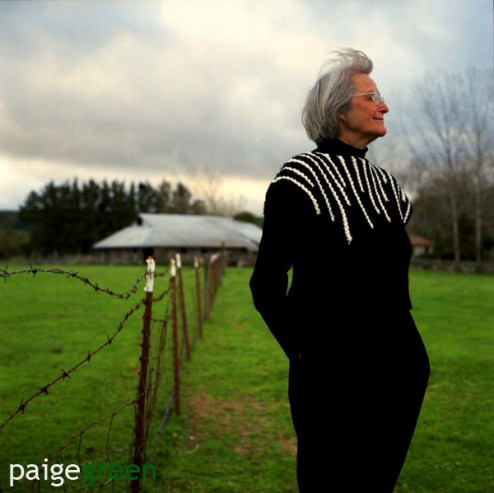
This first outerwear experiments for the Fibershed wardrobe were followed by many other inspirations from Luebberman’s flock– most importantly the creation of the wardrobe’s three pair of socks– (the socks were, and are extraordinarily sturdy), and are still in use even after constant and almost daily wear. When you only have three pair of socks, they have no time to rest….
As the socks aged, darning and repairing occurred, and the soles felted under the pressure and heat of walking feet. This created an even stronger sock, as it morphed slowly into what looked like a soft shoe. Conventional wool socks sold in the marketplace are often pre-washed in strong synthetic acids to de-scale wool fibers, and the wool is then blended with plastic based polymers allowing them to be washed and dried in a typical washing and drying machine without felting. The hand knit 100% wool sock is another animal all together, and one that has become well-loved and deeply appreciated within the Fibershed wardrobe. They contain no plastic fibers, and are truly representative of the natural wool fiber, with the scales left intact. The felted soles are an attribute, and have created a surprising level of comfort.
Luebbermann’s wools are not just sturdy, they also carry an identifiably unique and beautiful natural sheen that makes them a shoe-in for botanic based dyes, and for that reason there is much natural dye processing done on the farm. “I primarily offer my natural colored wools, with an accent of my own naturally dyed skeins,” said Luebbermann.
A collection of skeins are held together to show the repertoire of the naturally generated plant colors. Many of these skeins can be found at Luebbermann’s farmers market stand, and Black Mt. Weavers storefront in Point Reyes Station. The range of subtle colors Luebbermann achieves is due in part to the variation between wools within her flock. Different wool types, and their subtle natural color variation make for a beautiful foundation for natural dye work.
Luebbermann had cultivated a relationship with plant dyes, fiber varieties, and processing techniques for years, even before her move to the farm. “When I first moved to the East Bay, our community had a store called Straw Into Gold– it was an amazing fiber inspiration, and the man who created a lot of the equipment for the store– Alden Amos was also a very big inspiration of mine,” said Luebbermann during our lunchtime conversation. (Alden Amos continues to inspire many with his custom spinning equipment, that he produces at his home Dragonfly Farms.) Luebberman’s inspiration for hand spinning has strengthened and grown over the years, and you can find her alongside business partner and friend Marlie de Swart teaching spinning classes at Windrush Farm. The next series of classes begin on March 4th of 2012. For more details on spinning classes check with Marlie at BMA@sonic.net. You can also check out the very popular Sheep to Shawl series at the Regenerative Design Institute, starting on March 10, 2012.
Luebbermann shares her hands on knowledge readily with the community so that everyone has an opportunity to access the skills to make their own yarns. She also makes her new yarn collaboration “Local Pastures,” available to the general public. The yarn design is done by both Luebbermann and de Swart and the fiber is processed in small one-of-a-kind lots, each lot is milled at the nearby Yolo Wool Mill. “Our yarn varieties are made in just enough quantity so that some fortunate knitters will have the opportunity to make full size garments, each lot is comparable to a fine batch of wine or artisan cheese– it is unique and very high quality,” said de Swart, owner of Black Mt. Weavers in Point Reyes Station.
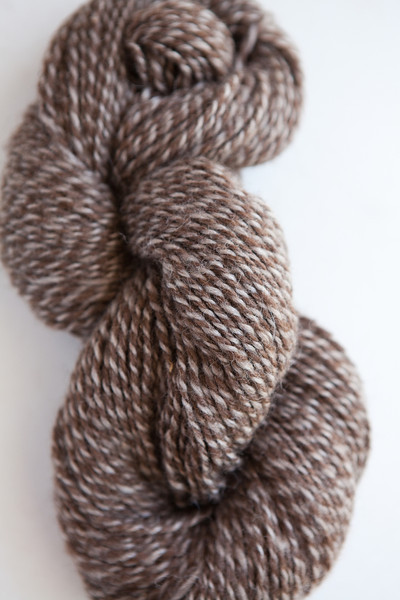
The subtlety of the natural sheep’s wool is the emphasis of the Local Pasture’s line. “Everything you see is straight from the animal’s own color scheme,” said de Swart. These colors are what the sheep create from metabolizing their surroundings, the grasses, alfalfa, water, and air–they are a true reflection of the earth’s natural color creation processes. Luebbermann and de Swart now offer the local pastures wool as an offering to knitters everywhere– and the reception to this new line has been strong, “People are enjoying these yarns, we’ve sold out of several lots already.” The collection can be found at de Swart’s own shop, Black Mt. Weavers, as well as the Fibershed Marketplace.
Working with Luebbermann and de Swart has been an on-going inspiration for the Fibershed project. Through their care, support, and passion–not only have garments been made for the one-year wardrobe, but they’ve carried the torch for local fiber farming long before Fibershed was even a word. They’ve spearheaded issues regarding fiber education, processing, and sales. They are actively engaged in every sphere of this community, and have consistently and tirelessly made themselves available for the cause of local agriculture and artisanship. While this is a reputation to be proud of…..It should not go unmentioned– Luebbermann has just recently been made the proud grandmother of her first grandson, Harper Albi Harris.
The reason for this mention is not simply to congratulate, but to also let you readers know that this little man’s momma–is our awesome and well-loved Paige Green (the famous Fibershed photographer who makes it all so vivid and alive). So…. if the degrees of separation need more clarifying–Luebbermann is the mother-in-law of the well-loved photographer, and she is also the mother of the well-loved musician Arann Harris.
Arran and Paige are cornerstones of the community– just like their mom… they’ve consistently offered their talents and time to the Fibershed project and many other non-profit efforts in our community– and for that we say thank you to the whole incredible sheep loving family!
You’re wonderful!
And don’t forget to visit the crew on February 26th at Windrush Farm for Shearing Day!
